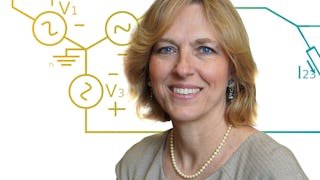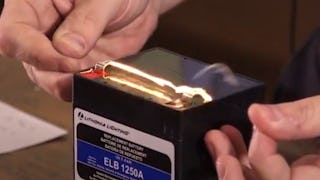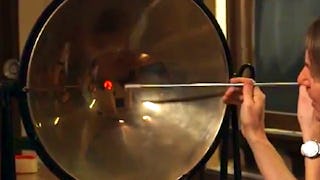This course explains how to analyze circuits that have direct current (DC) current or voltage sources. A DC source is one that is constant. Circuits with resistors, capacitors, and inductors are covered, both analytically and experimentally. Some practical applications in sensors are demonstrated.

Early bird sale! Unlock 10,000+ courses from Google, IBM, and more for 50% off. Save today.


(1,479 reviews)
Skills you'll gain
Details to know

Add to your LinkedIn profile
136 assignments
See how employees at top companies are mastering in-demand skills

There are 7 modules in this course
This module reviews background material from physics on the basic properties of electricity and electrical circuits.
What's included
16 videos4 readings23 assignments
The module describes some basic principles used in circuit analysis.
What's included
47 videos1 reading22 assignments
This module demonstrates physical resistive circuits and introduces several systematic ways to solve circuit problems.
What's included
33 videos11 assignments
This module introduces additional methods for analyzing circuit problems and how resistors are used in sensors.
What's included
14 videos1 reading15 assignments
This module introduces capacitors and inductors, which are called "reactive" circuit elements.
What's included
16 videos19 assignments
This module introduces the transient response behavior of RC and RL circuits after a switch in a circuit is changed.
What's included
12 videos27 assignments
This module demonstrates useful applications of capacitors and inductors in real engineering systems and introduces the behavior of second-order reactive circuits.
What's included
10 videos19 assignments
Earn a career certificate
Add this credential to your LinkedIn profile, resume, or CV. Share it on social media and in your performance review.
Instructors



Offered by
Explore more from Electrical Engineering


Georgia Institute of Technology
 Status: Free Trial
Status: Free Trial
Rice University


Georgia Institute of Technology
 Status: Free Trial
Status: Free Trial
Rice University
Why people choose Coursera for their career




Learner reviews
1,479 reviews
- 5 stars
69.05%
- 4 stars
19.72%
- 3 stars
6.95%
- 2 stars
1.89%
- 1 star
2.36%
Showing 3 of 1479
Reviewed on Mar 20, 2024
Good course at teaching the fundamentals of DC circuit analysis, as per the title. Would have given it 5-stars if the errors in some of the questions and auto-grading were fixed.
Reviewed on Jun 29, 2020
Course is great although there are mistakes that haven't been fixed for some time now. I would recommend regardless of the mistakes though.
Reviewed on Sep 7, 2020
The course is very helpful to us to understand the DC circit analysis a lot.Thank you to the team.As a faculty,I know the concepts well.So directly went to the quiz part.

Open new doors with Coursera Plus
Unlimited access to 10,000+ world-class courses, hands-on projects, and job-ready certificate programs - all included in your subscription
Advance your career with an online degree
Earn a degree from world-class universities - 100% online
Join over 3,400 global companies that choose Coursera for Business
Upskill your employees to excel in the digital economy
Frequently asked questions
Access to lectures and assignments depends on your type of enrollment. If you take a course in audit mode, you will be able to see most course materials for free. To access graded assignments and to earn a Certificate, you will need to purchase the Certificate experience, during or after your audit. If you don't see the audit option:
The course may not offer an audit option. You can try a Free Trial instead, or apply for Financial Aid.
The course may offer 'Full Course, No Certificate' instead. This option lets you see all course materials, submit required assessments, and get a final grade. This also means that you will not be able to purchase a Certificate experience.
When you purchase a Certificate you get access to all course materials, including graded assignments. Upon completing the course, your electronic Certificate will be added to your Accomplishments page - from there, you can print your Certificate or add it to your LinkedIn profile. If you only want to read and view the course content, you can audit the course for free.
You will be eligible for a full refund until two weeks after your payment date, or (for courses that have just launched) until two weeks after the first session of the course begins, whichever is later. You cannot receive a refund once you’ve earned a Course Certificate, even if you complete the course within the two-week refund period. See our full refund policy.
More questions
Financial aid available,

